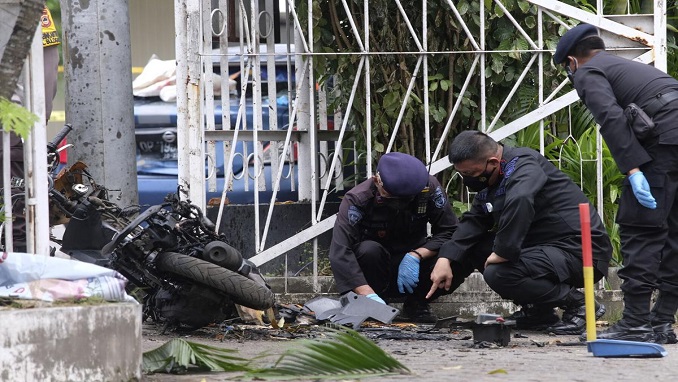Indonesian police found explosives on Monday in a raid outside the capital city Jakarta related to Sunday’s suicide attack on a cathedral on Sulawesi island,news channel Kompas TV reported as quoted by Sputnik.
The raids follow two suicide bombings in the city of Makassar, the capital of South Sulawesi province, during a service for Palm Sunday. According to the country’s chief security minister, Mohammad Mahfud, about twenty people were wounded in the Sunday attack and the two bombers were the only fatalities in the incident.
“There were two people riding on a motorbike when the explosion happened at the main gate of the church – the perpetrators were trying to enter the compound,” National Police spokesman Argo Yuwono said.
Jakarta police declined to comment on reports of the raids and national police did not immediately respond to a request for comment.
No group has claimed responsibility so far, but police on Sunday said the bombers were a man and a woman who belonged to Jamaah Ansharut Daulah (JAD), an Islamic State-inspired militant group suspected of suicide attacks on churches and a police post that killed at least 30 people in the city of Surabaya in 2018.
Four suspected JAD members were arrested on Sunday in the province of West Nusa Tengara related to the cathedral attack that same day. About 20 suspected JAD members were arrested in January and authorities believe the group was involved in the twin suicide attack on a Philippine church in 2019 that killed more than 20 people.
On Sunday, a blast occured outside a Catholic church in the city of Makassar located in the province of Southern Sulawesi, Indonesia. About twenty people sustained injuries in the suicide attack outside a church in eastern Indonesia on Sunday, the Xinhua news agency reported, citing police. A video that allegedly shows the CCTV footage that captured the moment of the blast was shared online.
The blast broke out near the gate of the Sacred Heart of Jesus Cathedral in Makassar, the capital of the South Sulawesi province, during Sunday mass at 10:28 a.m. local time (02:28 GMT). Cars parked nearby were damaged, Reuters reported, citing local news footage.
At the moment of the explosion, there were people inside the church, local media reported. Some body parts were reportedly found at the site, and several injured people were transported to hospital.
Indonesian media quoted the South Sulawesi Regional Police spokesperson, Kombes E. Zulfan, who described the explosion as a suicide bombing. One of the bombers was identified as a member of a group involved in a militant attack in the Philippines in 2018, police chief General Listyo Sigit Prabowo later told reporters.
National police spokesperson Argo Yuwono later told reporters that two suspected perpetrators were riding a motorbike as they tried to enter the church. He added that a charred vehicle and human remains were found at the scene. Wilhelmus Tulak, a priest at the church, told a local TV station that a parking attendant was burned when he tried to stop the attack.
The cause of the explosion was not immediately clear. However, local media reported, citing a witness, that several people had shouted that there was a “bomb” before the explosion.
”Some shouted ‘bombs’ and there were some restaurant waiters whose clothes were stained with blood”, one witness told CNN Indonesia.
Indonesian President Joko Widodo urged everyone to fight “terrorism and radicalism.” He instructed the police to find out if the perpetrators had ties to terrorist groups, in order to weed them out “to their roots.”
Makassar, the biggest city on Sulawesi island, reflects the religious makeup of Indonesia, which is the world’s largest Muslim-majority country and has a substantial Christian minority, among other faiths.
Churches in Indonesia, which is the world’s biggest Muslim-majority nation, have been repeatedly targeted by extremists in the past decade. In 2018, dozens were killed in bomb attacks on churches and a police department in the city of Surabaya. Police blamed the attacks on the Jamaah Ansharut Daulah (JAD) group inspired by Daesh.
In 2002, the country saw its worst-ever terror attack when 202 people, most of them foreign tourists, were killed in an attack on a nightlife district in Bali. The Jemaah Islamiah militant network claimed responsibility for the deadly attack.
